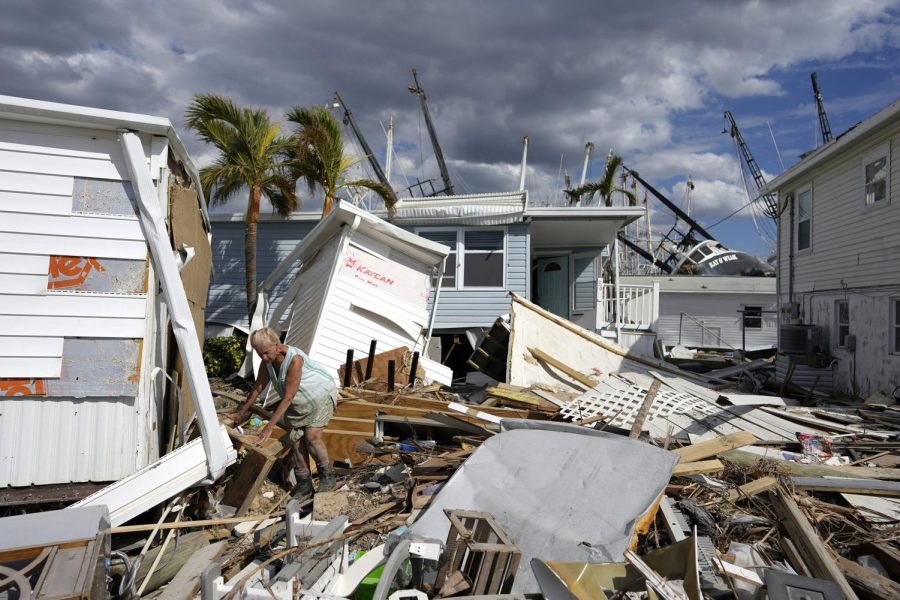Hurricane Ian is just the beginning
Climate change is making hurricanes stronger and more deadly
Floridians sort through the rubble after Hurricane Ian destroyed their homes.
October 16, 2022
On Tuesday, Sept. 27, Floridians braced for the worst as Hurricane Ian barreled towards the peninsula. Having obliterated the island of Cuba, fear grew as the storm consolidated, promising battering winds and ruthless rain.
The unpredictable nature of hurricanes quickly revealed that the “worst” residents were preparing for would not even approach the realized destruction Ian carried along with it. And as Hurricane Ian made landfall on Wednesday, Sept. 28 as a Category 4 hurricane, Florida reeled in the all-too-familiar confusion and chaos that the climate crisis has forced individuals across the world to confront.
As climate change has altered global weather patterns and increased the incidence of natural disasters, the intensity of these storms has worsened as well. Hurricane Ian is no exception — it is one of seven Category 4 or greater storms that can be defined as “rapid intensification events” that have impacted the United States since 2017.
Even despite the indisputable link between anthropogenic emissions and the climate crisis, Republican politicians are reluctant to acknowledge the role that humans play in the deterioration of the environment. Many, including Florida Governor Ron DeSantis, only go as far as to accept federal payments for disaster relief, while dodging the root of the crisis and further attempting to deny aid to other states plagued with the same problems.
DeSantis described the scene following Hurricane Ian as a “biblical storm surge.” There is nothing divine or inevitable, however, about the increasingly common rate at which natural disasters are occurring due to anthropogenic greenhouse gas emissions. Nor is there anything righteous about continuing to deny the very real impacts of climate change, when DeSantis’s own constituents are among those bearing the heaviest burden from these storms.
Consistent with all aspects of the Climate Crisis, those suffering the worst effects due to natural disasters are marginalized communities: people of color, those of lower socioeconomic status and others without the resources to ensure their safety as the planet changes.
For those living in Florida, the most vulnerable individuals have experienced the brunt of the damage. This includes undocumented migrants, who often refrain from seeking aid following disasters out of fear of deportation. Moreover, communities already lacking adequate means to address the mounting crisis have been living without power, seen their homes flooded and had their lives torn from them without a proper governmental response.
In anticipation of the 2024 presidential election, theories surrounding both the Republican and Democratic candidates have been at the forefront of American politics. The notion that DeSantis may appear on the ballot is not a distant thought, yet observing his allegiance to perpetuating climate denial instead of his commitment to his constituents reveals his already-apparent negligence.
The day after Hurricane Ian swept through Florida, DeSantis appeared on Fox News, preaching against polarization while failing to acknowledge his identity among a party that has politicized the issue of environmental health to begin with.
Hurricane Ian has demonstrated what has become obvious: the earth does not have more time, and putting people in power who jeopardize environmental health for the illusion of economic prosperity is not viable. The common nature of such devastating disasters serves as a stark and foreboding reminder that the fate of the planet hinges upon the results of the next election, and mobilizing voters who understand the severity of the situation is integral to generating necessary progress.
For those beginning to rebuild their lives in the aftermath of Hurricane Ian, there is only one way forward. And as politicians watch from afar, unimpacted and unconcerned, it is up to those of future generations to cast their ballots in the name of climate justice.















